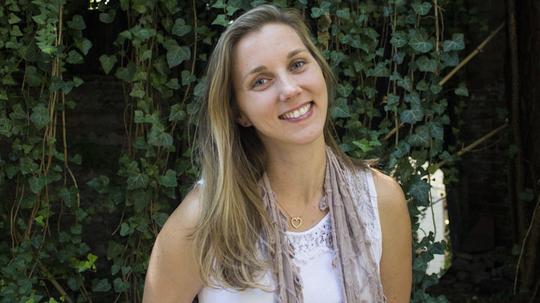
Editor's Note: This story was initially published in shorter form on the Cincinnati Business Courier, and is reposted here with permission.
Sept. 25 was one of the most exciting brand storytelling events in Greater Cincinnati: the 2018 ArtWorks Big Pitch.
Eight creative entrepreneurs took the stage at Memorial Hall to pitch their businesses in hopes of winning a $15,000 grand prize and a $5,000 audience choice award.
As founder of Untold Content and myself a former Big Pitch finalist, I analyzed the brand stories from the audience’s point of view this year. Storytelling techniques ranged from goofy to contemplative, strategic to impact-driven. Ultimately, for the fifth year in a row, male founders won both awards (Mortal Ski Company and audience choice went to Russo’s Ravioli).
So much of the Big Pitch experience and outcome depends on the startup founders’ storytelling tactics. They must engage the audience with their brand story, reveal the purpose and focus of their company and make a strong business case as to why they most deserve the funds from a business perspective. Think Shark Tank for creative entrepreneurship.
Let’s review the top storytelling techniques and reflect on how the competition could change in future years to address regional and national inequalities in venture backing and business support for women- and minority-owned businesses. Plus, let’s celebrate all eight of the finalists for the creative, economic impacts they make on our city.
Here are the top brand storytelling tactics revealed during this year’s ArtWorks Big Pitch.
Stories Drawing on Legacy
One of the most moving pitches this year was delivered by Anthony Russo of Russo’s Ravioli. Drawing on a 75-year family legacy of ravioli-making in the Queen City, Russo brought his brand to life by describing how he and his mom had re-awakened the family business that formerly thrived in Newport, Ky. starting in the 1940s. Hearing Russo describe his memories of making ravioli alongside his grandfather in their family restaurant was touching, and seeing his co-founder and mother visibly wiping tears from her eyes in the front-row of Memorial Hall added a profound layer of impact to his words. Russo’s pitch served as a powerful example of the unique impact of community and history on business success in Midwestern ecosystems like Cincinnati. Others in the audience must have felt similarly moved, as Russo won the $5,000 audience choice award.
Amber Zaragoza of Queen City Vignette similarly drew upon the power of legacy to reveal the impact of her vintage and specialty furniture rental company. Weaving her knowledge of interior design with a poignant understanding of Cincinnati’s architectural and design history, Zaragoza gave the audience colorful glimpses into her aesthetic, revealing how a vintage place setting could take diners back in time to feel as though they are under historical Union Terminal’s golden archways.
Stories Sparking Curiosity
Laura Moeller of Strange Stock Art Conservation used storytelling techniques that sparked curiosity, unveiling a hidden science of art conservation and making it powerfully relevant to individuals as well as institutional stakeholders. She showed how her company breathes new life back into damaged paper and photographic materials, from family photos stuck inside overly sticky albums to globally and regionally cherished pieces of art exposed to fire, water or just the natural wear of time. Moeller’s pitch ignited curiosity for a little-known discipline, making a scientific pursuit personal and relatable. Her mission is to provide the best museum quality services to everyone and her investment ask focused on growing her company through two new, hands-on experiences: Save-what-you-love workshops and STEM learning workshops that will inspire a new generation of conservationists.
Stories Revealing Impact
Drawing similarly on the impact that their companies could make on regional and even global matters, Justina Block of Osmia Bees and Taren Kinebrew of Sweet Petit Desserts both delivered clear “asks.” Kinebrew pitched the audience on a kitchen redesign investment that could transform her small bakery into a learning kitchen to empower local youth to learn about cooking and entrepreneurship. Her pitch was grounded in evidence of the success of her Junior Baking Series, which has sparked impressive regional impact already — in just its pilot phase.
Block, the founder of The Osmia Bee Company (known as the “Gentle Bee Company”) had perhaps one of the strongest global visions of the evening, showing clearly how her bee houses impact the world. She raised the stakes by revealing the scope of the global bee crisis, and explained that habitat loss is the number one reason why bee populations are dwindling. She showed clear business success by sharing her impressive current retailers—including the Cincinnati Zoo—and explained that her ask would help her scale bee house production after a year of success, where all of her bee houses sold out.
Stories Focused on Scale
Showing clearly how funds will enable scale within and beyond our region resembles the greatest Shark Tank successes. Susannah Tisue, founder of SKT Ceramics, shared a direct and profound need for the capital, showing how the Big Pitch funds would allow her to invest in a new kiln that could increase production reliability, reduce production time, and significantly lower her company’s environmental footprint." The storytelling technique of thinking big picture about regional and global impact, especially when contextualized with the core use of investor funds, is a smart storytelling strategy.
Richard Stewart of Madhouse Vinegar had a similarly clear and impactful “ask” for his company of “acid alchemists,” who convert Cincinnati’s best beers and wines into delectable, unique, and local vinegars. Describing their current bottling and labeling process, he showed how the grand prize could enable them to fulfill larger orders faster and reach markets beyond Cincinnati at a much more rapid rate.
Stories Leveraging Partnerships
Another powerful storytelling technique used by several of the competitors was partnering. Perhaps unique to Cincinnati’s tight-knit community spirit, many founders showed how their business’ success would empower and enable the success of others. For Madhouse Vinegar, their ability to more rapidly scale would mean more collaboration with local breweries. Queen City Vignette requested funds for investing in a new line of table settings in collaboration with one of last year’s Big Pitch finalists, CG Ceramics. A mindset of partnership reveals the power of community and mutual support in our city's startup economy.
Stories Drawing on Masculine Playfulness
This year, the judges ultimately awarded the grand prize to a brand that utilized masculine playfulness over other storytelling tactics. Mortal Ski Company kicked off their pitch by dumping Frisch’s ice into a plastic tub as a metaphor for icy Midwestern skiing conditions. The audience got a great laugh as they described how their skis are designed for slopes unique to the Midwest. This playful approach of a male-focused brand resembled last year’s winners, Ohio Valley Beard Supply, who clarified their “ask” for the $15,000 by unveiling a beard bar chart that showed how much their revenue would increase if they won the funds.
What This Year’s Storytelling Successes Reveal: A Need for Greater Support of Minority and Women-Owned Businesses
For the fifth year in a row, male small business owners won the Big Pitch grand prize and the audience choice award for organizations that more often than not create products marketed primarily to men (belts, beard lube, skis with masculine designs). This pattern should invite us to question whether and why some storytelling techniques are working more in favor of male brand evangelists.
However, this year’s judging panel included more women than last year. Plus for the first year, the number of women founders outnumbered men. These demographics reveal progress towards inclusivity in our city’s support for startup success, but they don’t necessarily provide our startup economy with more clarity about our path for equally supporting minority and women owned businesses.
National conversations and local efforts like the Minority Entrepreneurial Connectivity Assessment report, Queen City Certified (the first national certification acknowledging businesses for their success in hiring and promoting diverse women in their workplaces), and the upcoming NITRO Bootcamp to accelerate minority and women-owned businesses with technology (set to publicly launch in late October 2018) are all revealing and addressing the inequality in venture backing and financial support for minority-owned businesses. Powerful national and regional outliers like Hillman Accelerators, Aviatra Accelerators and Backstage Capital are emerging specifically to empower and fund minority and women startups whose brands reach markets heretofore untapped by the traditionally male-dominated world of venture capitalism.
Into the future, let’s continue to question the storytelling tactics, business assumptions, and evaluation criteria that have historically shaped the ways investors and cities like ours support small businesses. Incorporating judging criteria that speaks to regional and global impact, inclusivity, return on investment, ability to reach untapped markets, and evidence-based storytelling may position more minority and women-owned businesses to win the Big Pitch in future years — and deliver more risk capital for diverse startups in Cincinnati and beyond.
About the Author
Katie Trauth Taylor is CEO of Untold Content and is herself a former ArtWorks Big Pitch finalist. At Untold, Katie leads a creative team of content strategists and writers in crafting brand stories for researchers and subject matter experts at today’s most innovative organizations.








